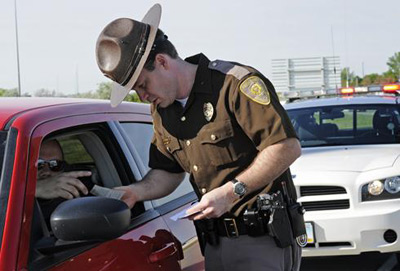The recession may be claiming a new victim: the 5-10-mph "cushion" police and state troopers across the USA have routinely given motorists exceeding the speed limit.

The Governors Highway Safety Association, which represents state highway safety offices, issued a report in 2005 stating that police in 42 states routinely let drivers exceed speed limits. (Dan Koeck, for USA TODAY)
As cities and states scramble to fill budget gaps with revenue from traffic citations, "not only are the (speeding) tolerances much lower, but the frequency of a warning instead of a ticket is way down," says James Baxter, president of the National Motorists Association, a Wisconsin-based drivers' rights group that helps its members fight speeding tickets.
"Most people, if they're stopped now, are getting a ticket even if it's only a minor violation of a few miles per hour," Baxter says. He cites anecdotal evidence of drivers being pulled over at slower speeds.
Tim Davenport, 42, of Kansas City, Mo., was recently stopped on 15th Street in Blue Springs, Mo., and ticketed for going 40 mph in a 35-mph zone - although the police officer initially ticketed him for 40 in a 25, he says. "I drove down that road again, and the posted limit was 35," he says. "I figured the judge wouldn't accept that, since I was over the speed limit, and would still charge me with it. So I went ahead and paid" the $60 ticket.
Ivan Sever, 60, of Boston was stopped on the Massachusetts Turnpike for doing 55 in a 45-mph speed zone. "I had just passed into the section where the speed limit is 45," says Sever, who teaches recording techniques at Berklee College of Music in Boston. "I saw the (trooper) and slowed down. I passed him carefully. He pulled me over, said I was doing 55."
The Governors Highway Safety Association, which represents state highway safety offices, issued a report in 2005 stating that police in 42 states routinely let drivers exceed speed limits. GHSA said the practice hampered efforts to reduce speeding.
"It's still done in some places but not in others," says Jonathan Adkins of GHSA. In places where police no longer allow the cushion, it might be because speed limits are creeping up around the country, he says.
He notes that Virginia's maximum speed limit will rise from 65 to 70 mph in July. Last year, Ohio raised the maximum speed limit for trucks on rural and suburban interstates from 55 to 65 mph. Texas, Iowa and Indiana have all raised their maximum speed limits since the GHSA study.
A study published last year in the Journal of Law and Economics found that police issue more traffic citations during recessions. From 1990 to 2003, counties in North Carolina issued significantly more tickets in the year following a decline in general tax revenue.
Researchers from the Federal Reserve Bank of St. Louis and the University of Arkansas-Little Rock found that a 10% decrease in revenue growth caused a 6.4% increase the following year in the growth rate of traffic tickets.
Troy Green, national spokesman for auto club AAA, says he's unaware of increasing complaints from members about being stopped at slower speeds.
Sgt. Michael Edes, chairman of the National Troopers Coalition, which represents 45,000 troopers, says there is no lower tolerance for speeding among state troopers. "I think you'll find (enforcement is) actually the opposite," he says. "A lot of states have cut (trooper) positions or frozen positions. Several states have grounded their aviation unit, so they're not doing as many speed details."
But it's clear that many communities are turning to traffic citations for added revenue in tough financial times:
Police in Canton, Ohio, for example, issued 2,011 traffic tickets in January - more than four times the 452 tickets issued in January 2009, according to Police Chief Dean McKimm. He says a decrease in crime in the city of 78,000 that's home to the Pro Football Hall of Fame has freed officers to do more traffic enforcement. McKimm says the additional revenue from traffic citations allows his understaffed department to hire more officers. "We're not writing tickets at lower (speed) thresholds," he says.
Tennessee is considering a measure similar to one adopted by Georgia last year that would add a $200 fine for "super speeders," those driving more than 25 mph over the posted speed limit, according to the office of Sen. Jack Johnson, a Franklin Republican who introduced the bill.
Speeding fines are being doubled in "travel-safe" zones on several stretches of highway in Missouri, including five in the St. Louis area. The state passed a law in 2008 that allows authorities to establish such "travel-safe" zones on high-crash stretches of highways. Fines also are routinely doubled in construction zones.











